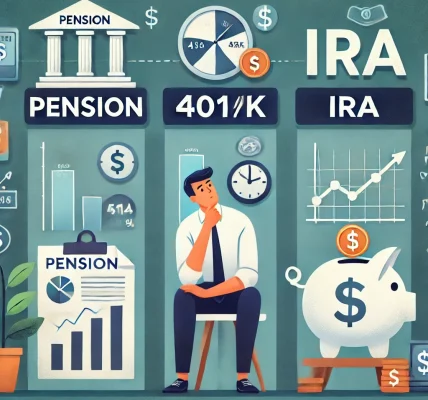Planning for retirement is one of the most crucial financial decisions you will make. With various retirement savings options available, it’s essential to understand the differences between pension plans, 401(k) accounts, and Individual Retirement Accounts (IRAs). Each of these options has its own benefits, drawbacks, and suitability depending on your employment status and financial goals. In this article, we’ll break down these three popular retirement plans to help you decide which one is right for you.
What is a Pension Plan?
A pension plan is a retirement savings plan offered by employers, where employees receive a fixed, predetermined payout upon retirement. These plans are also known as defined benefit plans.
How Pension Plans Work
- Employers contribute to a pension fund on behalf of employees.
- Employees may also contribute in some cases.
- Upon retirement, employees receive a steady income based on factors like years of service and salary history.
- Pension plans provide financial security but have become less common in private sectors due to the costs associated with maintaining them.
Pros of Pension Plans:
✅ Guaranteed income for life post-retirement. ✅ No need for employees to actively manage investments. ✅ Often backed by the government or employer for financial security.
Cons of Pension Plans:
❌ Limited control over investment choices. ❌ Heavily dependent on employer solvency. ❌ Less flexibility compared to other retirement plans.
What is a 401(k) Plan?
A 401(k) is an employer-sponsored retirement savings plan that allows employees to contribute a portion of their salary to a tax-advantaged investment account.
How 401(k) Plans Work
- Employees contribute a percentage of their salary before taxes (Traditional 401(k)) or after taxes (Roth 401(k)).
- Employers may match contributions up to a certain percentage.
- Contributions grow tax-deferred (Traditional) or tax-free (Roth).
- Withdrawals are typically allowed after age 59½, with penalties for early withdrawals.
Pros of 401(k) Plans:
✅ Higher contribution limits than IRAs. ✅ Employer matching contributions boost savings. ✅ Tax benefits: Pre-tax contributions reduce taxable income (Traditional 401(k)). ✅ Wide range of investment options, including mutual funds and ETFs.
Cons of 401(k) Plans:
❌ Limited investment options compared to IRAs. ❌ Early withdrawal penalties before age 59½. ❌ Employer-based plan restrictions on withdrawals and loans.
What is an IRA (Individual Retirement Account)?
An IRA is a personal retirement savings account that offers tax advantages, allowing individuals to save independently of their employer.
Types of IRAs
- Traditional IRA
- Contributions are tax-deductible.
- Withdrawals in retirement are taxed as ordinary income.
- Mandatory minimum distributions (RMDs) start at age 73.
- Roth IRA
- Contributions are made with after-tax money.
- Withdrawals in retirement are tax-free (including earnings, if held for at least five years and after age 59½).
- No required minimum distributions (RMDs) in retirement.
- SEP IRA (Simplified Employee Pension IRA)
- Designed for self-employed individuals and small business owners.
- Higher contribution limits than Traditional or Roth IRAs.
- Contributions are tax-deductible and grow tax-deferred.
Pros of IRAs:
✅ Greater control over investment choices compared to 401(k)s. ✅ Tax advantages depending on the type of IRA. ✅ Roth IRA provides tax-free withdrawals. ✅ No employer dependency (ideal for self-employed individuals).
Cons of IRAs:
❌ Lower annual contribution limits than 401(k)s. ❌ Income restrictions for Roth IRA eligibility. ❌ Traditional IRAs require mandatory withdrawals (RMDs) at a certain age.
Comparing Pension Plans, 401(k), and IRAs
| Feature | Pension Plan | 401(k) Plan | IRA |
|---|---|---|---|
| Employer Sponsored? | Yes | Yes | No |
| Investment Control | Low | Moderate | High |
| Tax Benefits | Tax-deferred | Tax-deferred or tax-free (Roth) | Tax-deferred (Traditional) or tax-free (Roth) |
| Contribution Limits | Employer-based | Higher than IRA | Lower than 401(k) |
| Withdrawals | Guaranteed lifetime income | Allowed after 59½ (with penalties before) | Allowed after 59½ (with penalties before) |
Which Retirement Plan is Right for You?
Choosing the best retirement plan depends on your financial situation, employment status, and retirement goals. Here are some key takeaways:
- If you have access to a pension plan, it’s a great option for guaranteed income in retirement, but you may still want to supplement it with a 401(k) or IRA.
- If your employer offers a 401(k) plan, contribute enough to maximize any employer match, as this is essentially free money.
- If you’re self-employed or don’t have an employer-sponsored plan, an IRA or SEP IRA can be an excellent way to save for retirement with tax advantages.
- If you want maximum control over investments, an IRA offers more flexibility than a 401(k) or pension plan.
Final Thoughts
Understanding the differences between pension plans, 401(k)s, and IRAs can help you make informed decisions for your retirement. No matter which option you choose, the key is to start saving early, take advantage of tax benefits, and stay consistent in your contributions. A well-planned retirement strategy ensures financial security and peace of mind in your golden years.
Need help selecting the right retirement plan? Consult with a financial advisor to tailor a plan that fits your goals!




